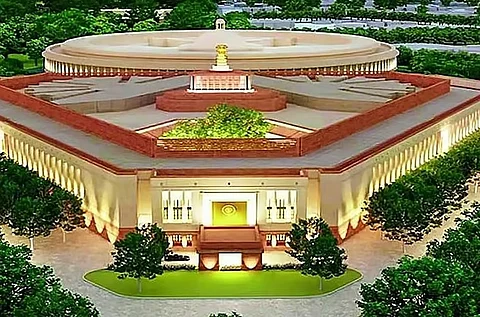

A total 158,651.077 hectares of cropped area has been affected due to hailstorm/heavy rain/flood during the ongoing monsoon season, Shivraj Singh Chouhan, Union minister of agriculture and farmers welfare told the Lok Sabha.
Crops affected include paddy, wheat, barley, mustard, jowar, bajra, maize, onion and horticulture crops.
So far, 10.05 crore (100.5 million) rural households have been organised into 90.90 lakh (9.09 million) self-help groups (SHGs) under the Deendayal Antyodaya Yojana-National Rural Livelihoods Mission (DAY-NRLM).
The Lakhpati Didi initiative, an outcome of DAY-NRLM, is intended to empower and enable women SHGs earn a minimum income of Rs 100,000 per annum on a sustainable basis, with an average monthly income of at least Rs 10,000 sustained for at least four agricultural seasons and/or business cycles.
So far 1,48,32,258 SHG households women have become Lakhpati Didis, Chandra Sekhar Pemmasani, minister of state in the Union Ministry of Rural Development told the Lok Sabha.
Some 44,596 pigs have died due to African Swine Fever (ASF) and 8,295 pigs have been culled during the last five years to prevent the spread of the disease, S P Singh Baghel, minister of state for fisheries, animal husbandry and dairying told the Lok Sabha.
Under the solar off-grid programme, a total of 17,23,479 solar home light systems and 9,44,802 solar street light systems have been installed. Further, a solar thermal collector area of 19.8 million square metres have been installed for solar water heating application, Shripad Yesso Naik, minister of state for new & renewable energy and power told the Lok Sabha.
The National Institute of Solar Energy (NISE) has worked on the development of small-scale renewable technologies such as solar cold storage and solar dryers for decentralised applications. NISE has carried out the installation of three pilot solar cold storage units, following which more than 100 units have been installed by industry across India.
In addition, around 310 solar dryer units have been installed by NISE in the Leh and Kargil regions, with support from the horticulture department of the Union territory of Ladakh, Naik added.
The cumulative capacity of solar projects installed in India as on June 30, 2025 is 116.25 GW. The energy generated during 2024-25 is 144.15 Billion Units (BU). A total of nine Battery Energy Storage System (BESS) projects (≥ 1 MWh capacity) with a cumulative installed capacity of 204.5 MW/ 505.6 MWh are currently operational in the country, Naik, told the Lok Sabha.
Solar energy generation has increased from 60.40 BU in financial year 2020-21 to 144.15 BU in financial year 2024-25, Naik told the Lok Sabha.
The World Health Organization (WHO) on May 28, 2025, issued a Disease Outbreak News (DON) wherein it highlighted that since mid-February 2025, global SARS-CoV-2 activity has been increasing, particularly from countries in the Eastern Mediterranean, South-East Asia, and Western Pacific regions, including India. The said report also pointed out that while global SARS-CoV-2 variant trends have slightly shifted since early 2025 and reporting of NB.1.8.1 variant (Nimbus) is increasing, the overall increases in COVID-19 are broadly consistent with levels observed during the same period in the previous year, Prataprao Jadhav, minister of state in the Union Ministry of Health & Family Welfare told the Lok Sabha.
The Union Ministry of Railways has informed that no train with the name ‘cancer train’ is operational on Indian Railways. The Centre is implementing the ‘Strengthening of Tertiary Care Cancer Facilities’ scheme. Under this scheme, support is provided to states and Union territories for the establishment of State Cancer Institutes (SCIs) and Tertiary Care Cancer Centres (TCCCs) across the country. The maximum permissible assistance is Rs 120 crore for each SCI and Rs 45 crore for each TCCC. Till date, a total of 39 institutions (comprising 19 SCIs and 20 TCCCs) have been approved under the scheme, including the SCI at Government Medical College, Amritsar, and the TCCC at Civil Hospital, Fazilka. Radiotherapy and chemotherapy services are available at Government Medical College, Amritsar, while chemotherapy services are available at Civil Hospital, Fazilka, Jadhav told the Lok Sabha.
As per a recently published study (J Assoc Physicians India 2025), a new sub type of diabetes called ‘Maturity Onset Diabetes of the Young’ has been identified in India. It is a type of monogenic diabetes caused due to mutation of a single gene called ATP (Adenosine Triphosphate) Binding Cassette Subfamily C Member 8 [ABCC8] as reported in the published article.
So far, 14 different types of Maturity Onset Diabetes of the Young have been identified. Of these 14 types, Maturity Onset Diabetes of the Young-1 and Maturity Onset Diabetes of the Young-3 are the commonest in India, Jadhav told the Lok Sabha.